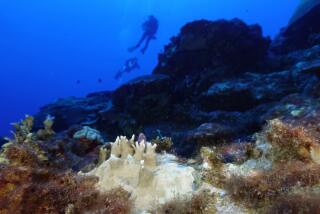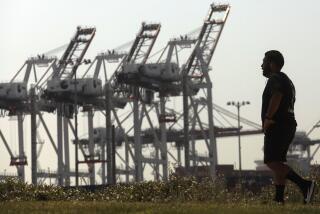8 Nations to Battle North Sea Pollution : Conference OKs Sweeping Measures to Protect European Waters
- Share via
LONDON — The eight nations bordering the North Sea agreed here Wednesday on sweeping measures to reduce pollution of the vital European body of water.
The accord was reached by the environment ministers of the North Sea nations during a two-day meeting, which conference Chairman Nicholas Ridley of Britain called a “great success.”
The ministers decided to give the North Sea the designation “special protection area,” which guarantees safeguards to reduce pollution.
Ridley said these included ending the disposal of garbage at sea, eventually ending incineration of wastes at sea and controlling the dumping of material offshore.
The environment ministers also said that effluents entering rivers emptying into the North Sea will be more strictly controlled and that the eight nations will set up a system of air surveillance to check on offshore pollution.
Radioactive discharges and radioactive wastes will be the subject of a special study to determine how to keep them from polluting the sea, said Ridley, who is also Britain’s environment minister.
While the attending states--Britain, France, West Germany, Belgium, the Netherlands, Denmark, Sweden and Norway--did not formally ratify a convention, they agreed, Ridley said, “to a common declaration of political will.”
“The conference represents a major step forward against the pollution of the North Sea,” he said. “Pollution in the Rhine River will be reduced, and contamination of other sorts will be reduced or ended by certain, fixed dates.”
Technically, the North Sea coastal nations can only control activities up to 12 miles offshore, but the ministers agreed to act cooperatively since the North Sea is viewed by scientists as a single ecosystem.
Maritime Crossroads
The North Sea, too, is historically a maritime crossroads for the northern European nations and serves as a rich fishing ground, a beach resort area and, most recently, the site of almost 100 oil and gas platforms supplying 30% of the bordering nations’ energy needs.
But in recent decades, its cold waters have been badly polluted, mostly by the rivers flowing from industrial nations, fallout from atmospheric effluents and dumping of wastes by ships.
Despite the admitted need for action, trouble had been forecast for the eight-nation conference, mainly between Britain on one side, against all the others.
This is because the prevailing winds and currents affecting the North Sea tend to shift pollutants in an easterly and southeasterly direction, piling them up near West Germany, Holland, Belgium, Denmark, and to a lesser extent, France to the west, and Sweden and Norway to the northeast. Thus, most of Britain’s pollutants are ending up on continental shores.
Politicians in some continental nations, particularly West Germany, have expressed the belief that Britain is dragging its feet on establishing stricter pollution controls. It is, for example, the only country that dumps treated sewage, known as sludge, into the sea.
But Britain claimed that the sludge is dumped, and sinks into, the deepest part of the sea, toward the northern outlet to the Atlantic, and is not particularly harmful.
British officials also said they have cleaned up the rivers flowing into the sea--the Thames, Humber, Tees and Tyne--while by far the major pollutant villains were the continental rivers--the Rhine, Meuse, Weser and Elbe--which empty into the shallowest part of the North Sea.
The West Germans have taken the lead in pressing for tougher controls on pollutants, and the first North Sea conference was held in Bremen three years ago.
The Bonn government is also worried about reports that 20 to 30% of the fish catch in the North Sea may be diseased. During one such scare earlier this year, when a television program showed horrifyingly detailed pictures of infected fish, sales of North Sea fish plummeted in West Germany.
The West Germans, along with the Dutch and the Danes, are also concerned about the future of the Wadden Sea, a long, bay-like stretch of water that parallels the North Sea but is separated from it by the Frisian Island chain.
This is an area of tidal mud flats, sandbanks, and salt marshes teeming with marine and bird specimens. Much of the area has been threatened by pollution from continental rivers whose deltas go through the Wadden Sea.
Some British observers on Wednesday attributed Britain’s willingness to go along with continental neighbors over tough controls to the conference’s opening speech by Prince Charles. The heir to the British throne made a tough speech calling for severe restrictions to protect the North Sea, including immediate action “to cut the input of dangerous substances” and “to tackle the garbage that lines some of our beaches with a ribbon of filth.”
Referring to his days in the Royal Navy, he remarked, “Knowing how long this stuff lies around, I fear that some of the rubbish tossed overboard from the ship I commanded 10 years ago may still be there.”
More to Read
Sign up for Essential California
The most important California stories and recommendations in your inbox every morning.
You may occasionally receive promotional content from the Los Angeles Times.













